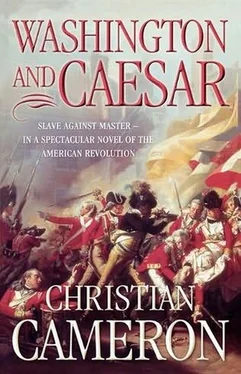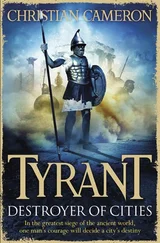Christian Cameron - Washington and Caesar
Здесь есть возможность читать онлайн «Christian Cameron - Washington and Caesar» — ознакомительный отрывок электронной книги совершенно бесплатно, а после прочтения отрывка купить полную версию. В некоторых случаях можно слушать аудио, скачать через торрент в формате fb2 и присутствует краткое содержание. Год выпуска: 0101, ISBN: 0101, Издательство: HarperCollins, Жанр: Исторические приключения, на английском языке. Описание произведения, (предисловие) а так же отзывы посетителей доступны на портале библиотеки ЛибКат.
- Название:Washington and Caesar
- Автор:
- Издательство:HarperCollins
- Жанр:
- Год:0101
- ISBN:9780007389698
- Рейтинг книги:3 / 5. Голосов: 1
-
Избранное:Добавить в избранное
- Отзывы:
-
Ваша оценка:
- 60
- 1
- 2
- 3
- 4
- 5
Washington and Caesar: краткое содержание, описание и аннотация
Предлагаем к чтению аннотацию, описание, краткое содержание или предисловие (зависит от того, что написал сам автор книги «Washington and Caesar»). Если вы не нашли необходимую информацию о книге — напишите в комментариях, мы постараемся отыскать её.
Washington and Caesar — читать онлайн ознакомительный отрывок
Ниже представлен текст книги, разбитый по страницам. Система сохранения места последней прочитанной страницы, позволяет с удобством читать онлайн бесплатно книгу «Washington and Caesar», без необходимости каждый раз заново искать на чём Вы остановились. Поставьте закладку, и сможете в любой момент перейти на страницу, на которой закончили чтение.
Интервал:
Закладка:
“How is Captain Lake, Marquis?”
“He does very well. His arm has healed cleanly. The hospital was worse for him than the wound, I think. I will have him out on patrol in a few days.”
“What? Doesn’t he want a furlough like every other officer?”
“General, George Lake is the true believer, yes? He will not leave this army until the enemy is beaten.”
John Laurens bowed from the door and came in, snatching his share of the punch. He was in some middle ground between the ragged soldiers outside and the near perfection of Lafayette, but when the situation had been explained to him, he was able to translate for von Steuben very well indeed. When the three men began to discuss military matters in French, Washington cleared his throat and stood to his dominating height, and the others rose immediately.
“My pardon, General. I meant no rudeness.”
Washington smiled, a thin smile that left his teeth hidden, but with some warmth. “I must go back to the army’s work, gentlemen. Colonel Laurens, may I leave the Freiherr in your capable hands? Marquis, I thank you for bringing him, although I must say that I would have thought you natural enemies.”
“Perhaps in Europe, Mon General. Here, we unite in the cause of liberty.” Lafayette bowed deeply and the men withdrew, leaving Washington to plan his campaigns. Somehow, between the Yankee captain, George Lake’s recovery and von Steuben, his mood had changed. He was pleased.
Billy closed the door and smiled.
Philadelphia, April 30, 1778
The army reentered Philadelphia to muted celebrations. The people of the City of Brotherly Love had watched armies come and go for three seasons now, and were inured to the change. The Loyalists missed the British, and indeed, so great a revel had the Mischianza proved that some heads were still recovering from it.
The return of the Continental Congress restored the city to the position of capital, and the government returned with a rush, eager to renew the business of politics and also to seize the property of avowed Loyalists. It was a difficult time, particularly as the enemy was just across the river in New Jersey, busy retreating on New York, and Washington was keen to get across and harry their retreat.
George Lake had marched through the city before, but the last time he had been a corporal. Now he was a captain, and thanks to the generosity of the marquis, he almost looked the part, in a good blue coat with red facings, a smart leather helmet with a visor, and his fine sword hanging by his side. He even wore good top boots in emulation of his idol. Behind him, his company shared in his fortune. Every man had a good wool coat, brought as bounty from France. The coats had been shared through the army by lottery, but most of the light infantry had received theirs first, not least because Lafayette had many friends among the younger officers of that corps. So Lake’s company, one of the best in the army, led the parade that was also a pursuit: they were to march through the city and board a ferry the next day.
Reclaiming his company had proved less of a hazard than recruiting it. By the time George was fully recovered, he found his company had shrunk to just twenty-five men under a sergeant he didn’t know. In his absence, the other officer hadn’t been replaced and no drafts had been procured. George had been forced to tour the other companies and importune Colonel Weedon for more men. In time he’d got them and a new officer, Lieutenant Isaac Ross, a Scotsman from Alexandria with a far better claim to the rank of officer than George Lake. Ross, however, first encountered his new commander having wine with the much revered Marquis de Lafayette and never thought to question his commander’s antecedents.
Ross was better than adequate. He roamed the column and watched the sergeants and made George’s life very easy, so that as they neared a certain corner, close by the City Tavern, George was able to turn his attention to a certain house. It was still a block away when George saw men at the windows and someone smashing the front door with an axe. He knew that the Lovells were Loyalists, and he knew the temper of the times.
“Mr. Ross? Indian files from the flanks of sections, if you please. At the double!”
George waited until his men began to file off and then led them up the side of the column, trotting along smartly. The men in the companies ahead were studiously looking the other way, trying to ignore what was happening under their noses.
George’s friend Caleb commanded the company just short of the house. “What’s your hurry, George?”
George pointed at the Lovells’. “I’m intending to stop the looters.”
“Folks inside are Tories.”
“Folks looting them are scum, Caleb.”
“Aye, then. True enough. I’ll back your play.”
George turned away and motioned to his men. “Take them. I want them all as prisoners. Smartly now, and no shooting.”
He drew his sword and led a few men into the Lovells’ central hall. A big man was carrying a sewing table and seemed surprised to see a Continental officer appear.
“This ‘ere’s my place. Go get your own.”
George jabbed him in the face with the hilt of his sword and broke the man’s nose. “Take him.”
Ready hands grabbed the man and George took the sewing table before it got broken. Around the house, through the great casemented windows, George could see his own men and Caleb’s forming a cordon. His sergeant was arresting men in the library.
George called out: “Mrs. Lovell? Mr. Lovell?”
He heard voices from upstairs and ran to the top, where he found a huddle of men, none in uniform. The best dressed stepped in front of George and raised his hand. His voice was shaking, whether with emotion or fear George cared little.
“Halt! Soldier, you are interfering with the orders of the Congress.”
“Take him,” said George, grabbing the man’s outstretched arm and pulling him down the steps.
“Damn you, sir! I am an officer of Congress…”
“Are you now? Where were you at Valley Forge, then? Take him, boys.”
The man disappeared into a welter of soldiers. When it had been a matter of helping Tories, the men had been hesitant, but as soon as George made it a matter of taking men who claimed to be patriots but declined to serve in the army the soldiers were suddenly very active.
The rest of the looters at the head of the stairs stood warily. One man had drawn a pistol.
George pointed. “Is that loaded? Put it down this instant or you’re a dead man.”
The man hesitated. The barrel swung slowly, as if the man couldn’t decide where to direct it.
“Down, I say,” said George, quietly. Behind him, one of his corporals took careful aim from the steps. The pistol was placed on the floor.
“Take them all outside. Mrs. Lovell!”
More cries, this time from farther up in the house, perhaps the servants’ quarters. George pushed through the men, sullen now, and snatched up the pistol. Then he turned a corner and went up some narrower steps to a door. The door was shut and there were two men with a crowbar outside.
“Drop the bar and clear the door, lads.”
They saw the pistol and cowered away.
“Straight past me and down the hall. Don’t make a fuss or you’ll be killed. Good lads.” They were younger than the rest, perhaps less spoilt, and they did as he said.
“Mrs. Lovell?” he shouted.
“Who’s that?”
“George Lake of the Continental Army, ma’am. Your house is clear. You can come out.”
He heard a shriek from inside the door. He was thinking of knocking it down himself when it was opened from inside. Mrs. Lovell’s face was bright red, and her shawl was wrapped around one hand, which was bleeding. Betsy was behind her.
Читать дальшеИнтервал:
Закладка:
Похожие книги на «Washington and Caesar»
Представляем Вашему вниманию похожие книги на «Washington and Caesar» списком для выбора. Мы отобрали схожую по названию и смыслу литературу в надежде предоставить читателям больше вариантов отыскать новые, интересные, ещё непрочитанные произведения.
Обсуждение, отзывы о книге «Washington and Caesar» и просто собственные мнения читателей. Оставьте ваши комментарии, напишите, что Вы думаете о произведении, его смысле или главных героях. Укажите что конкретно понравилось, а что нет, и почему Вы так считаете.












